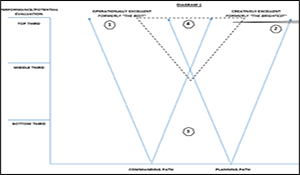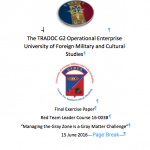Managing the Gray Zone is a Gray Matter Challenge

Managing the Gray Zone is a Gray Matter Challenge.
Speaker: Monroe, M. (Army University of Foreign Military and Cultural Studies).
Date: July 2016.
From 03/28 to 06/03/2016 15 students participated in a nine-week Command and General Staff College Red Teaming elective. In the final exercise the class spent seven days studying gray zone concepts and questions using red teaming methodologies to analyze the concept and offer their insights and recommendations. This paper is the result of their work. The authors promote an alternative approach, which is to adapt officer career and education tracks to create a more operationally and intellectually excellent officer corps. The gray zone is a competition of ideas, and the authors assert that managing the gray zone requires intelligent management of our intellectual capital. The central idea of their alternative approach is to take an internal look to ensure that the Army officer corps maintains a robust educational and institutional base focused on creating a force that can recognize, adapt, and successfully counter the kinds of challenges that gray zone activities present.
Mr. Mark Monroe retired from the Marine Corps in 2009 as a Colonel after 29 years of service. He commanded aviation and artillery units from artillery battery to aviation group-level command, and served at Headquarters Marine Corps, Plans, Policies, and Operations as Readiness Branch Head for the Corps. Mark is a veteran of Desert Shield/Storm, OIF, and several operational deployments. As a naval aviator he held every designation in the UH-1N, and logged 4,200 hours in several type/model aircraft. He served as an instructor at the Marine Corps Weapons and Tactics School, the US Army Command and Staff College, and US Army School of Advanced Military Studies. Mark is a graduate of Oklahoma University, the Naval War College, and the US Army Fellowship program. He currently works with the US Army University of Foreign Military and Cultural Studies at Fort Leavenworth, Kansas, as a Seminar Leader for Red Team training.

Comments